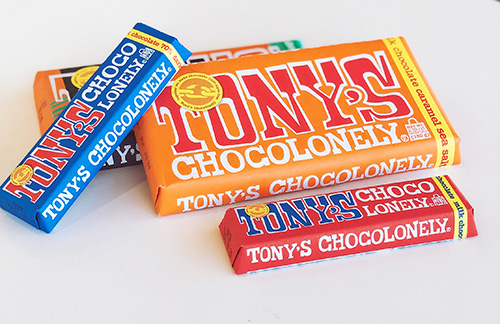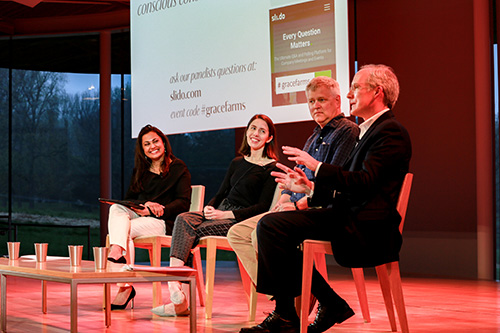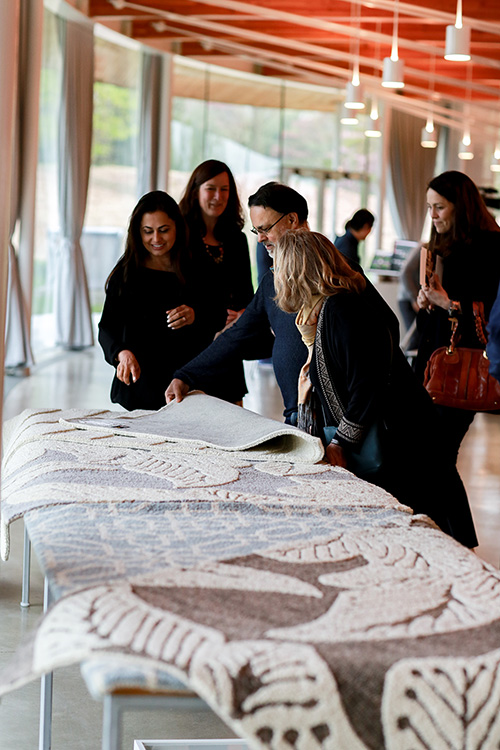Topics
By Krishna Patel, former Grace Farms Justice Initiative Director
Ensuring an Ethical Supply Chain Through Ambitious Commitments and 3rd Party Auditors
Behind the feel-good stories of producing ethically-made products, companies such as West Elm/Williams-Sonoma, Inc., are diligently working on supply-chain transparency to identify and eradicate the use of forced labor. In a recent panel discussion on Conscious Consumerism, part of our lecture series on the Demand for Ethical Supply, the behind-the-scenes partnerships with third-party auditors were a central theme. In addition to adhering to sustainable production principles, there must be the willingness to delve into the dark side of our supply chains. Perhaps with such a commitment, companies could one day eradicate slavery from their supply chains. That’s a story worth heading towards.
Our consumption patterns are directly linked to the ubiquity of modern slavery in the world. Slavery is currently the second largest criminal industry and the fastest growing crime. There are more people enslaved now than at any other time in human history. So much of this slavery exists because of forced labor. With pledges to eradicate human slavery by major companies and laws that forbid slavery, it seems paradoxical that there’s an increase in forced labor. That’s because there continues to be an inherent tension between consumers and companies: Consumers wish to buy products at the lowest possible price, while companies want to sell those products at the highest possible price and make the most profit.
It should therefore come as no surprise that slavery is linked to every global commercial supply chain. As multinationals move more and more of their operations offshore in search of cheaper labor and inputs, forced and low-priced labor become a necessary ingredient to compete in global markets. Moreover, as supply chains grow into global, complex supply and opaque networks, the more difficult it’s been to track and report abuses.
The Global Slavery Index estimates that in 2018 alone, the top five at-risk slave-made products (technology, garments, fish, cocoa, and sugarcane) imported by businesses and governments in the G20 countries was collectively valued at $354 billion dollars. The United States was the largest consumer of those high-risk products at $144 billion or 41 percent.
Major Chocolate Makers Fail on Their Pledges: Is Regulation Necessary?
The majority of the world’s cocoa supply comes from Ghana and Cote d’Ivoire. Because cocoa is in the top five at-risk slave-made products imported by the G20 countries, there have been conversations about whether regulation is necessary to eradicate slavery from this supply chain, given the number of children that appear to be victims of forced labor. Major chocolate makers, including Mars and Hershey, pledged years ago to eradicate “the worst forms of child labor” from their West African cocoa suppliers, where about two-thirds of the world’s cocoa comes from. The failure on the pledge, nearly 20 years after making it, is told in a recent Washington Post investigative report. Many of the big manufacturers still can’t identify all of the farms where their cocoa – a key ingredient in chocolate – comes from, and whether child labor was involved in the production.
“To eradicate contemporary slavery and build ethical and transparent supply chains, we must assess what’s working.” – Krishna Patel, former Grace Farms Justice Initiative Director
Mars, for instance, maker of Milky Way and M&M’s, can only trace 24 percent of its cocoa back to the farm level, according to the Washington Post. Nestlé, however, can track 49 percent of its global cocoa supply to its farms. Representatives from some of the large chocolate makers said they are reluctant to guarantee that any of their products were produced without child labor, according to the report.

Tony’s Chocolonely is made without slave or forced labor. It’s the only chocolate sold at Grace Farms. The company has made inroads into major retailers. © Ashley Sikora
The World Cocoa Foundation Responds
Why such dismal track records? The World Cocoa Foundation, a Washington-based trade group, said that when the industry signed onto the 2001 agreement, they didn’t know the real magnitude of the complexities, including poverty and corruption. The International Labor Organization (ILO) estimates that one-fifth of all African children – 72.1 million – are involved in child labor, a proportion more than twice as high than in any other region. “Nine percent of African children are in hazardous work, again highest of all the world’s regions,” according to the ILO.
The World Cocoa Foundation’s spokesperson added that companies are working against strong economic forces that push children into hard labor. The spokesperson added, however, that the industry has made great strides in building schools, supporting agricultural cooperatives, and advising farmers on better production methods. This investment in the community, while important, shouldn’t let chocolate makers or any company off the hook. There’s also the tendency to point at West African governments, home to some of the poorest areas in the world, for their lack of support.
Judging from the numbers, perhaps companies really don’t want to commit. The chocolate industry makes an estimated $103 billion in sales each year, compared to more than $150 million spent over the past 18 years on the problem, according to the Washington Post.

Our Conscious Consumerism panel, from left to right: Krishna Patel, former Justice Initiative Director, Rebecca van Bergen, Founder and Executive Director of U.S.-based not-for-profit Nest, Doug Guiley, Senior Vice President of West Elm Global Sourcing and CSR Williams-Sonoma, Inc., and Pete Spain, Co-Founder and COO of eye heart hand. © Alexa Bennett
This investigative report came out shortly after our Conscious Consumerism panel, which included Doug Guiley, Senior Vice President of West Elm Global Sourcing and CSR Williams-Sonoma, Inc., Rebecca van Bergen, Founder and Executive Director of U.S.-based not-for-profit Nest, and Pete Spain, Co-Founder and COO of eye heart hand. Besides actionable strategies that emerged, such as the use of credible third-party auditors, these companies have made real and ambitious commitments to eliminate forced labor from their supply chains.
The Grace Farms Commitment
There were no arguments that a supply chain was too complex or resources were too scarce to tackle this problem. We heard commitment and follow through. There needs to be an intention not to sell products tainted with slave labor. It’s why Grace Farms sells only Tony’s Chocolonely chocolate. The Amsterdam-based confectionery chocolate company has made a conscious decision to eliminate slavery in its supply chains so its chocolate could be one-hundred percent slave free.
Like our panelists, Tony’s Chocolonely, which reportedly makes over 50 million (euros) in revenue, is committed to knowing its cocoa farmers and supply partners. The company sees itself as an impact company that makes chocolate. “The company pays a higher than average price for their beans and doesn’t charge noticeably more at retail,” according to an article in Fast Company. “That means slimmer profits, about 3 percent of the price per bar.”
Working With Credible Third-Party Auditors
Besides making ambitious commitments, these companies – large and small – partner with third-party auditors. West Elm, maker of furniture and home décor, couldn’t have made their supply chains more ethical and sustainable without its third-party auditors. Doug, with more than 25 years of retail sourcing experience said: “It was really about trying to understand how do you look at that (home-based artisans) sector and how do you find the right partner to bring transparency to it. That’s how we became connected with Nest – they really understand artisan craft.”
“So, the first thing you do is to make some ambitious goals to see if you can achieve them.” – Doug Guiley, Senior Vice President of West Elm Global Sourcing and CSR Williams-Sonoma, Inc.
The company partnered with Nest, a not-for-profit, founded by Rebecca van Bergen about 13 years ago. “At the time Muhammad Yunus won the Nobel Peace prize for microfinance, and I was really motivated by that concept and exploring ways to support women in a more holistic way,” Rebecca said.
Nest focuses on helping women in the home-based craftwork industry – the second largest employment of women internationally. “It’s safer, in general, for women to work from their homes in developing countries,” she said. “As companies push women into factories there is far less transparency into wages, health, and safety,” she added.
Together, Nest and West Elm, drafted and launched the first set of standards for home-based workers. “A lot of those terrible labor issues happen where there isn’t a lot of visibility,” Rebecca said. “Forward thinking companies such as West Elm do their homework and create policies to protect against labor slavery.”
“We spend six to nine months working very closely with them and then come in and do a traditional audit. We call it an assessment that really looks at 130 different standards.” – Rebecca van Bergen, Founder and Executive Director of U.S.-based not-for-profit Nest.
Besides working to improve transparency for home-based artisans, West Elm has also built transparency into its furniture-making process. For instance, West Elm established a benchmark: At least 50 percent of the wood they sourced would receive certification from the Forestry Stewardship Council, the gold standard in mapping the supply chains back to the forest to make sure it comes from a sustainable source, Doug said. This benchmark doesn’t mean the rest of their wood may not come from sustainable sources. But the company needed to establish a goal and process that could be replicated.
Size of the Company Doesn’t Matter, but Commitment Does
It would be easy to shrug off auditing a supply chain due to the lack of resources. One small manufacturer, eye heart hand, made the commitment to sell their handmade rugs without forced or bonded labor. Each rug is hand- made by certified artisans with fine New Zealand wool. It partners with GoodWeave, which certifies that no child, forced or bonded labor, is used in the Indian facilities where its rugs are made. All of their rugs bear the GoodWeave certification label.

Krishna Patel, former Justice Initiative Director, and visitors look at the rugs on display made by artisans for eye heart hand who work with third-party auditor GoodWeave. Nobel Peace Prize Laureate Kailash Satyarthi started GoodWeave over 25 years ago. © Alexa Bennett
“In the past we worked with suppliers who made false claims about the sourcing for our products,” said Pete Spain, Co-Founder and COO of eye heart hand. “We wanted to work with artisans who felt they were getting a fair shake in the process. From our experience, well-treated workers and a respected collaboration, leads to extraordinary outcomes.”
GoodWeave was started in India by Nobel Peace Prize Laureate Kailash Satyarthi over 25 years ago in an effort to end child labor and trafficking. Since then, he has rescued over 6,700 children from labor and has provided quality education to nearly 26,000 vulnerable children, according to the organization.
“Our rugs are made in a breezy studio where GoodWeave has gone 25 times since March 2017; each time they found it to meet the qualifications – no forced labor, no bonded labor, and documented work-force conditions. And the progress criteria is getting better and better,” Pete added.
None of these outcomes mentioned would be possible if not for a commitment to one day eradicate slavery from supply chains. “It’s important to start out with a commitment to ambitious goals,” Doug said. “Such goals certainly raise the concern that it will cost the company too much money and that consumers will balk at price increases. It’s a valid concern, but not the reality,” he added.
Ambitious goals often come from knowing and seeing injustices. Former Dutch journalist Teun “Tony” van de Keuken witnessed the injustices that led to Tony’s Chocolonely. Since the company’s launch in 2005, Tony’s has become the largest Dutch chocolate maker, selling its chocolate at major retailers including World Market, REI, and Whole Foods.
For Tony’s, West Elm, eye heart hand, and Nest, it would have been easier to turn away and pretend they didn’t know the extent of labor exploitation. It’s time for more companies to make ambitious commitments to support a growing number of consumers who want products made without slavery. It’s also time companies take a leadership role and educate consumers – feel-good stories help, but so does the truth. It is also important for consumers to use their purchasing power to send a message. The next time you have a choice to make about what chocolate bar to buy or rug to purchase or piece of furniture to select, we would ask you to send a message.
Our President and Founder Sharon Prince says, “Once you know, you cannot un-know it.”
Pretending that we don’t know shackles us to old ways of thinking.
In our perspectives, The Demand for Ethical Supply, we’ve included more analysis and interviews with Rebecca van Bergen, Founder and Executive Director of U.S.-based not-for-profit Nest and Pete Spain, Co-Founder and COO of eye heart hand.
Sign up for our newsletter to learn more about Grace Farms’ programs and our initiatives: nature, arts, justice, community, and faith.
Related work at Grace Farms:
Fighting Human Trafficking | Workshop
Clean Fashion Supply Chain | Documentary
Grace Farms | A Platform for Good

